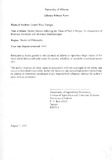Quality Factors Affecting the Value of Beef in Kenya: An Assessrnent of Relevant Attributes and Altemate Methodologies
Abstract
In order to idem% and estimate the implicit values of quality attributes of Kenyan
beef, revealed preference data on carcass prices and attributes and experimental choice
data on butchers' contingent behaviour are collected and analysed. Three different
methodological approaches are applied to denve estimates of implicit values; (i) a hedonic
price model based on revealed preference data, (ii) a discrete choice model of butchers
market choices, and (üi) a model of butchers' stated preferences. The three approaches are
assessed and compared. Collinearity is evident in the revealed preference data and is
avoided by experimental design in the stated preference data. However, the results from
the three models are generally consistent. The results show that carcass damage and the
quality attributes of carcass conformation, fatness, and weight are important in determining
the value of a beef carcass at the wholesale level. Improvements in the handling of animals
to reduce animal stress and visible damage on the carcass would increase carcass value.
Carcass conformation is the most important of the carcass attributes. There seem to be
optimal levels of carcass fatness and weight above which carcass prices are discounted.
The results indicate that efforts by farmers, livestock traders and animal breeders to
improve these quality attributes could increase the value of carcasses. These attributes
could also be used for the establishment of a carcass grading or classification scheme that
is economically meaning. Comparison of the three approaches to characteristic valuation
demonstrate their relative weaknesses and strengths. It is suggested that a model that
combines the revealed and stated preference data sets may provide an opportunity to
exploit the strengths and avoid the weaknesses of each data set.

